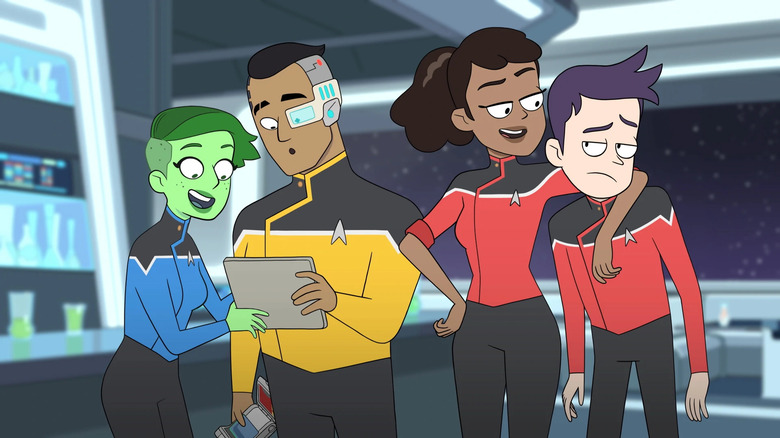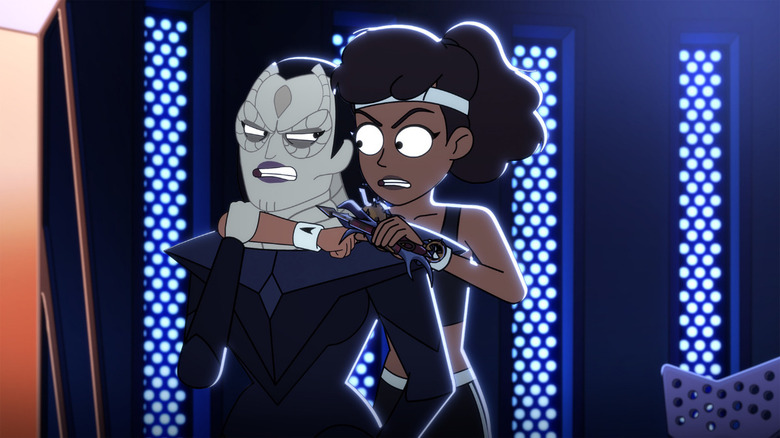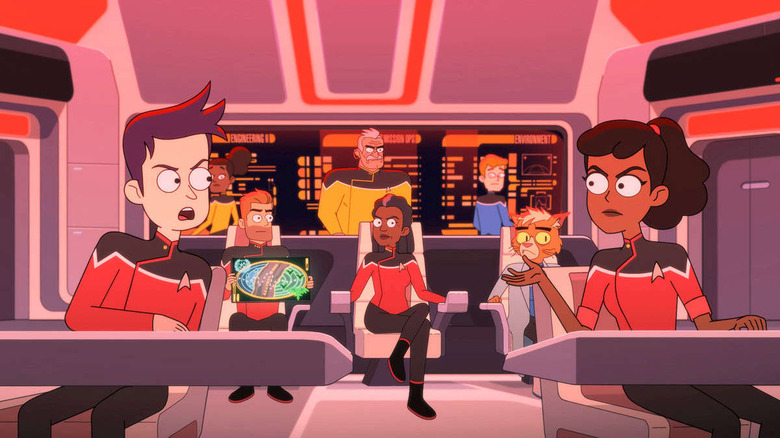The Writers Took A Leap Of Faith For Star Trek: Lower Decks Season 2
Creating anything unique is always a bit risky, but when you're putting the time and effort into writing an entire season into a TV show, that leap of faith can be so much bigger. In an interview with StarTrek.com, series creator and executive producer Mike McMahon shared the biggest secret behind creating "Lower Decks" season 2: they wrote it before season 1 had even finished airing!
"Star Trek: Lower Decks" has one of the best, if not the best, first seasons in the entire franchise. "Star Trek" is notorious for its difficult-to-get-through first seasons (I'm looking at you, "The Next Generation"), so "Lower Decks" getting mixed season 1 reviews is still pretty good, in context. McMahon and his crew wrote all of the episodes for season 2 before knowing what worked or what didn't, which is pretty terrifying in a series with so many carefully crafted in-jokes. They also went bigger and weirder in season 2, taking animated "Star Trek" to places where it had never gone before. All of that work was done without the promise of a season 2 even being made, but they went for it anyway.
More faith than a cluster of Kais
"Lower Decks" takes a lot of risks. While it's not the first animated "Star Trek" series, it is the first one for adults, and it's also the first "Star Trek" comedy series. The franchise has plenty of humor, but nothing as crass or in-your-face as "Lower Decks." Not only that, but "Trek" fans are pretty protective of their lore, and the referential, Easter-egg-filled humor in "Lower Decks" would either work perfectly or make die-hard fans mad. According to McMahon:
"The scariest thing about season 2 is we wrote it before season 1 aired. I had done this entire season of Star Trek that I knew that I liked, but had not seen an audience reaction for yet to, you know? Which is really scary because I was like, 'are people going to like a comedy Star Trek? An animated Star Trek that's not for kids? That's this length? That's in the TNG era?' I don't know."
"Trek" fans were upset enough to tune out when "Star Trek: Deep Space Nine" didn't feature exploration, so how might they react to a vulgar, adults-only animated show that still holds true to the series core values? A lot of the humor in "Lower Decks" relies on "Trek" knowledge, but it's also pretty flippant towards some beloved characters and stories. "Lower Decks" takes the piss out of "Star Trek" in the way that a comedy roast does, skewering its subject with lots of love. The fear, then, is that some fans just might not find it funny.
Crafting comedy that's true to Trek
In order to keep himself on the right track, McMahon created a set of "North Stars" to guide him. His love for the actors he worked with and the characters they created together, along with a promise to "never let the show get predictable," would lead him on his mission to create a fantastic second season. Making a comedy "Star Trek" that ties into much of the greater canon isn't easy, especially with just how much "Star Trek" exists at this point. McMahon explained the method to his madness in crafting season 2:
"Let's let the show be a celebration of all things 'Star Trek' and a celebration of personal exploration as opposed to scientific exploration and lean into all the comedy and do all the things we love but don't go down the same paths. There's 800 episodes of 'Star Trek.' You read about trying to write 'Voyager' back in the day, that was hard. And they only had 600-something episodes of Star Trek to not re-walk down the same path of. So there's all of that in my head. There's, 'how is this funny? How is it true to the characters? How is it true to the show?' And then, 'will people even like the stuff we already did, or are we writing a second season that maybe people don't want to see 'Three Ships?” I knew I did. And you just have to gamble on yourself and the stuff that you like. And I'm really happy with what we did."
Writing referential humor is hard. Writing referential humor when you have 800 episodes of content to draw from is really tough. Writing referential humor with that much content and a fanbase that obsesses over every little detail? Nearly impossible. Somehow McMahon and his team did it, in part because of their genuine love for all things "Star Trek." The second season drew on the humor of the first, but dug much deeper into its characters, giving them transformational arcs and real, complex personal conflict. The characters of "Lower Decks" feel just as fleshed out as their live-action counterparts by the end of season 2, making a silly animated comedy into a true "Trek" series worthy of the franchise.
Check out "Star Trek: Lower Decks" season 3 when it hits Paramount+ this summer.


